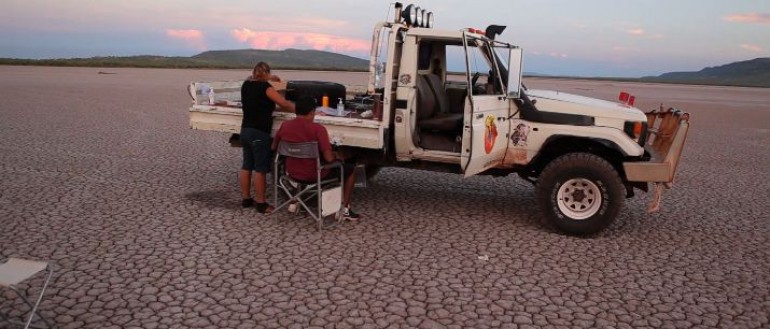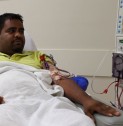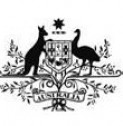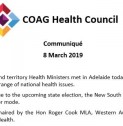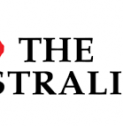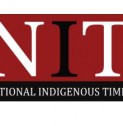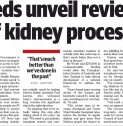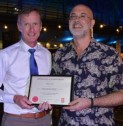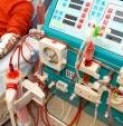Chronic kidney disease (CKD) affects many Australians, however Aboriginal and Torres Strait Islander people living in remote areas suffer the heaviest burden of all Australians. Aboriginal and Torres Strait Islander people tend to be affected at a younger age, are more likely to present late for dialysis, are less likely to receive a transplant and, in comparison to non-Indigenous people, will die younger.
People with CKD suffer poor health outcomes and reduced quality of life. For people living in remote communities, where there are limited dialysis services, the impact on families and communities is devastating.
From past research, we know that kidney disease is strongly linked to other chronic diseases, such as diabetes and heart disease. To tackle and lessen the burden of chronic kidney disease in Aboriginal and Torres Strait Islander people we need to understand the factors that predict progression, including the acceptability of different models of care.
The Renal Health Program within the Wellbeing and Preventable Chronic Diseases Division strongly focuses on evidence translation, identifying new and innovative strategies to improve service delivery and program evaluation to inform policy. It works in partnership with government and non-government health services locally and at the national level to identify, develop and support innovative strategies to facilitate improved management of chronic conditions including kidney disease, improve the patient journey and strengthen health systems.
The Renal Health Program aims to develop expertise and provide leadership in digital health, clinical research, consumer engagement, learning and growth of the clinical workforce, and promoting knowledge translation. To that end, the program collaborates closely with other program areas in Menzies to facilitate cross-fertilisation of ideas and create synergies across Divisions.
The program includes a multidisciplinary team of senior researchers and project staff, statisticians, qualitative researchers and evaluators, software developers, nurses, and First Nations consumer engagement officers.
Our research focus:
- To discover the best ways to diagnose, treat and prevent chronic disease such as diabetes, heart and kidney disease.
- To identify ways to improve systems and processes to support patients with kidney disease across the care continuum.
- To translate research findings into policy and practice.
Our research impact:
- In 2016 our research identified the most efficient, cost-effective and acceptable aspects of CKD management programs for Aboriginal and Torres Strait Islander people.
- Our findings demonstrated that opportunities existed to design systems to support primary health services with timely, targeted and evidence-based specialist care in the identification and management of people with kidney disease.
- In partnership with the government and non-government health services we have designed and built an integrated clinical decision support tool for early CKD identification and management, to consolidate patient records from multiple source systems and close the information gap between service providers.
- Our research has highlighted the need to include the patient perspective in health care design and delivery. We have worked closely with patient groups, consumers and Aboriginal and Torres Strait Islander co-researchers in a variety of ways to develop sustainable mechanisms for the inclusion of the patient voice in service delivery. From facilitating the development of patient-led cultural awareness programs, to advocating for greater Indigenous knowledge of, and authority over, their data, to understanding ‘what makes a good life and a good life on dialysis’ for Indigenous people.
- With our partners across government and non-government sectors we are working together to determine the most cost-effective dialysis models of care. This work will synthesise the data and information from multiple sources and will include perspectives of efficiency, effectiveness and acceptability – the number, money and people stories.
Project partners
- Northern Territory Department of Health
Collaborators
- Ampilatwatja Health Care Aboriginal Corporation
- Aboriginal Medical Services Alliance Northern Territory
- Anyinginyi Health Aboriginal Corporation
- Australia and New Zealand Dialysis and Transplant Registry
- Central Australian Aboriginal Congress
- Central Australian Renal Voice
- Department of Corporate and Digital Development
- Katherine West Health Board
- Kidney Health Australia
- Laynhapuy Homelands Aboriginal Corporation Health
- Mala’la Health Service Aboriginal Corporation
- Miwatj Health Aboriginal Corporation
- National Health and Medical Research Council
- Northern Territory Primary Health Network
- Northern Territory Renal Services
- Pintupi Homelands Health Service
- Pandanus Medical GP Practice
- Purple House
- Red Lily
- Renal Advocacy Advisory Committee
- Sunrise Health Service
- Top End Medical GP Practice
- Transplant Society of Australia and New Zealand
- Wurli Wurlijang Health Service
- University of Melbourne
- University of Tasmania
Key staff:
-
-
-
-
-
-
-
-
Archana Shapkota
-
Ben Creswick
-
Cheryl Ross
-
Emidio Coccetti
-
Harshana Munasinghe
-
-
-
-
-
-
Honorary Researchers
PhD Researchers
-
Dr Sajith Nayer
Current projects:
- Territory Kidney Care: A care clinical decision support system to facilitate integrated care for people with chronic kidney disease in the Northern Territory
- RART (Rapid Applied Research Translation)
- Territory Integrated Care: Primary health data Linkage Using Software (TIC PLUS)
- The CKD Consortium: Evaluation of chronic kidney disease identification and management in primary care in three jurisdictions across Australia
- Evaluation of impact of Territory Kidney Care (TKC) systems on chronic kidney disease (CKD) identification and management in Northern Territory (NT)
- My Health Record upload from Territory Kidney Care
- INFERR Study: Intravenous Iron Polymaltose For Indigenous Patients with High Ferritin Levels on Haemodialysis; A Prospective, Open-Label, Blinded Endpoint, Randomised Controlled Trial
- Return to Country: A national platform study to return Indigenous renal patients home
- Dialysis Models of Care: A partnership project to examine the costs and outcomes of different dialysis models and proximity to home
- 'Making Sense and Informing Action': Renal Research Knowledge Translation and Exchange with Aboriginal People, Policy Makers and Service Providers
- PK Study: Comparison of immunosuppressant drug pharmacokinetics in Aboriginal and non-Aboriginal Australian kidney transplant recipients
- North to South: The care and outcomes of people with end-stage kidney diseases in South Australia and the Northern Territory, 2001-2018
- Medication monitoring in NT Indigenous kidney transplant recipients
- Chronic kidney disease, diabetes mellitus and water quality in remote NT communities
- eGFR study: accurate assessment of renal function and progression of chronic kidney disease in Indigenous Australians
Recently completed projects:
- Acute Kidney Injury Retrospective Study
- Catching Some Air-Asserting Indigenous Information Rights in Renal Disease
- Central Australian Renal Study Technical Report Update
- Closing the loop on life-threatening melioidosis infections: observational research informing clinical practice change and policy for adults with severe kidney disease
- Developing a patient-led component of cultural awareness training for renal services in Alice Springs.
- Distance and the impact on electrolyte results in the NT
- Evaluation of CKD management in select NT Aboriginal community controlled health organisations
- Evaluation of Renal Case Management Program
- Evaluation of Top End Health Services Renal Outreach Program
- Final evaluation of Top End Outreach Ophthalmology Resource Project
- Forensic approach for reservoir identification for serious S. aureus infections in Top End dialysis clients (STARRS)
- Fred Hollows Foundation Remote Service Delivery Evaluation
- Improving Indigenous Kidney Transplant Outcomes
- Indigenous Patient Voices
- Socioeconomic outcomes and ESKD
- Systematic review of chronic kidney disease programs
- Urine ACR ratio and the impact of contaminants
-
Pascoe, S., Croker, D., Ross, L., Henwood, P., Wilkshire, N., Algy, C., Bob, S., Hall, H., Misener, M. and Gorham, G. The Role of Aboriginal Kidney Health Mentors in the Transplant Journey: A Qualitative Evaluation. Health Promotion Journal of Australia 36: e70000 (2025). https://doi.org/10.1002/hpja.70000
-
Chen, W., Howard, K., Gorham, G., Abeyaratne, A., Zhao, Y., Adegboye, O., Kangaharan, N., Taylor, S., Maple-Brown, L. J., Talukder, M. R., Majoni, S. W., and Cass, A. Cost-Effectiveness of Clinical Decision Support to Improve CKD Outcomes Among First Nations Australians. Kidney International Reports 10: 2 (2025). https://doi.org/10.1016/j.ekir.2024.10.028
- Gorham, G., Abeyaratne, A., Heard, S., Moore, L., George, P., Kamler, P., Majoni, S.W., Chen, W., Balasubramanya, B., Talukder, M.R., Pascoe, S., Whitehead, A., Sajiv, C., Maple-Brown, L., Kangaharan, N., and Cass, A. Developing an integrated clinical decision support system for the early identification and management of kidney disease—building cross-sectoral partnerships. BMC Medical Informatics and Decision Making 24: 69 (2024). https://doi.org/10.1186/s12911-024-02471-w
- Lowell A, Jones Y, Aitken R, Baker DR, Lovell J, Togni S, Gon̲d̲arra D, Sometimes B, Smith M, Anderson J, Sharp R, Karidakis M, Quinlivan S, Truong M, and Lawton P. Why surveys are ‘very hard’: exploring challenges and insights for collection of authentic patient experience information with speakers of Australian First Nations languages. Rural and Remote Health 24: 8380 (2024). https://doi.org/10.22605/RRH8380
- Thanasos, V. and Gorham, G. Concept of wellbeing among renal patients in the Top End. Partyline 84 (2023). https://www.ruralhealth.org.au/partyline/article/concept-wellbeing-among-renal-patients-top-end
- Ralph, A.P., McGrath, S.Y., Armstrong, E., Herdman, R.M., Ginnivan, L., Lowell, A., Lee, B., Gorham, G., Taylor, S., Hefler, M., and Kerrigan, V. Improving outcomes for hospitalised First Nations peoples though greater cultural safety and better communication: the Communicate Study Partnership study protocol. Implement Science 18: 1 (2023). https://doi.org/10.1186/s13012-023-01276-1
- Gorham, G., Howard, K., Cunningham, J., Lawton, P.D., Ahmed, A.S., Barzi, F., and Cass, A. Dialysis attendance patterns and health care utilisation of Aboriginal patients attending dialysis services in urban, rural and remote locations. BMC Health Services Research 22: 251 (2022). https://doi.org/10.1186/s12913-022-07628-9
- Gorham, G., Howard, K., Cunningham, J., Barzi, F., Lawton, P.D., and Cass, A. Do remote dialysis services really cost more? An economic analysis of hospital and dialysis modality costs associated with dialysis services in urban, rural and remote settings. BMC Health Services Research 21: 582 (2021). https://doi.org/10.1186/s12913-021-06612-z
- Hughes, J., Majoni, S., Barzi, F., Harris, T., Signal, S., Lowah, G., Kapojos, J., Abeyaratne, A., Sundaram, M., Goldrick, P., Jones, S., McFarlane, R., Campbell, L., Stephens, D. and Cass, A. (2019). Incident haemodialysis and outcomes in the Top End of Australia. Australian Health Review 44: 2 (2019). https://doi.org/10.1071/AH18230
- Gorham, G., Howard, K., Zhao, Y., Ahmed, A.M.S., Lawton, P.D., Sajiv, C., Majoni, S.W., Wood, P., Conlon, T., Signal, S., Robinson, S.L., Brown, S. and Cass, A. (2019). Cost of dialysis therapies in rural and remote Australia - a micro-costing analysis. BMC Nephrology 20: 231 (2019). https://doi.org/10.1186/s12882-019-1421-z
Click here to view more kidney publications in PubMed.
- Stay strong on country - a message about coronavirus from Barunga, NT
- Stay strong on country - a message about coronavirus from Darwin, NT (English)
- Stay strong on country - a message about coronavirus from Tiwi, NT (Tiwi)
- Stay strong on country - a message about coronavirus for Yolŋu
- Stay strong on country - a message about coronavirus from Lajamanu, NT (in Warlpiri)
- History and database of cultural awareness programs in the Northern Territory

